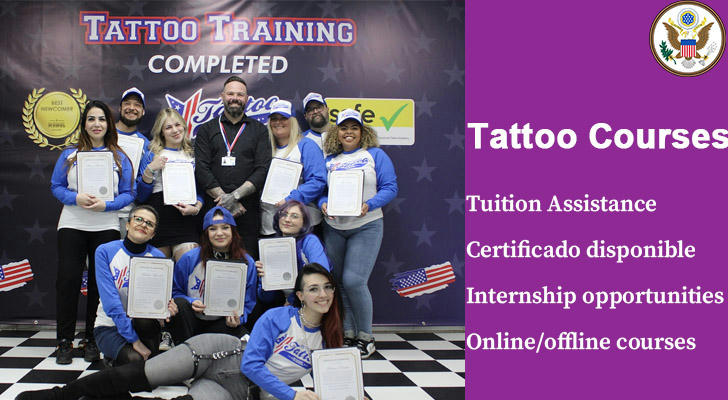🎨 How to Become a Tattoo Artist in the United States: Training, Certification, and Tuition Funding
Tuition Assistance |Certificado disponible | Internship opportunities | Online/offline courses

💡 Why Tattooing is a Career Worth Pursuing
Becoming a tattoo artist offers many practical and creative advantages:
- 🎨 Artistic freedom: Create meaningful designs for real clients
- 🧑💼 Independent work model: Choose your clients, projects, and work hours
- 💸 Earning potential: Experienced artists can earn high hourly rates
- 🌍 Cultural demand: Tattoos are widely accepted and appreciated
- 🔁 Constant innovation: The industry evolves with new techniques and tools
🏫 Tattoo Schools and Their Training Benefits
Several professional institutions in the U.S. offer structured programs for aspiring tattoo artists, many of which provide partial tuition assistance, flexible schedules, and supervised hands-on experience. Below are three of the most recognized schools, along with their standout advantages:
✍️ Florida Tattoo Academy (FTA)
Located in Florida, this academy offers a comprehensive curriculum with a strong focus on practical learning. Students work with real clients under expert supervision, which facilitates a smoother transition to the professional world. Highlights include:
- Support with state licensing requirements and sanitation regulations
- Core training in hygiene, sterilization, and biosecurity—critical for licensure
- Acceptance of GI Bill benefits for eligible veterans
- Business-focused modules on studio management and client marketing
🖌️ Master Tattoo Institute (MTI)
Based in Miami, MTI provides bilingual training (English and Spanish) with highly regarded instructors. Benefits include:
- In-person intensive programs with one-on-one coaching
- Portfolio development under the guidance of industry professionals
- Certifications valid across several states, great for artists who plan to move
- Licensing support and optional externship opportunities
- Access to state-supported financing and veteran benefits
💻 Tattooing 101 (Online Platform)
This digital platform offers foundational knowledge for those who want to explore tattooing before investing in studio training:
- On-demand video tutorials, quizzes, and downloadable resources
- Flexible self-paced learning, perfect for students with jobs or family commitments
- Instruction in tattoo machine types, skin anatomy, sterilization procedures, and ink handling
- A great stepping stone before starting formal training or apprenticeships
✅ Advantages of Training in a Formal Setting
Studying at an accredited tattoo school helps build both artistic and business readiness:
- Technical mastery of line work, shading, color, and personalized style
- Compliance with state health codes and licensure protocols
- Client interaction and marketing skills taught as part of modern courses
- Mentorship from licensed instructors, with portfolio evaluations and feedback
- Flexible financial options, including installment plans and GI Bill acceptance at many institutions
📋 How to Enroll in a Tattoo Program
Enrolling typically includes these steps:
- Research state licensing laws—they vary greatly across the U.S.
- Choose an accredited school that meets these requirements
- Inquire about financial aid or tuition assistance, including GI Bill eligibility
- Submit an application with required documents: ID, health records, sample work (if needed)
- Start your training, which blends classroom learning, hands-on tattooing, and professional coaching
🎯 Recommended by Age Group
| Age Range | Ideal Learner Profile | Key Benefits |
|---|---|---|
| 18–30 | Young creatives starting out | Time to build a portfolio, GI Bill support, mentorship access |
| 31–45 | Mid-career individuals seeking a new direction | Evening/weekend classes, flexible tuition, fast track to employment |
| 46+ | Passion-driven adults or second-career professionals | Life experience, focus on personal style, teaching/mentoring roles |
🎉 Real Story: From Veteran to Tattoo Artist
Carlos, a 34-year-old veteran from Texas, had always dreamed of turning his love for art into a profession. After leaving the military, he explored career options and discovered the Florida Tattoo Academy. Thanks to his GI Bill benefits, he was able to cover a large portion of the tuition.
He began with Tattooing 101, completing the online modules to gain basic theory and machine handling skills. Then, he transitioned to FTA’s in-person training, where he worked on real clients and refined his personal tattooing style.
After completing the course and passing state licensing exams, Carlos opened his own tattoo studio in Austin. Within a year, his reputation grew, and he began offering apprenticeships to new artists, many of whom were also veterans. Today, Carlos is a respected professional known for his detailed black-and-grey pieces and dedication to teaching.
Tattooing combines passion, technique, and entrepreneurship. With accredited schools, online resources, and veteran support like the GI Bill, you don’t need a traditional college degree to succeed in this field. Whether you're young and ambitious or looking for a midlife creative change, tattooing is a viable and rewarding career path.
